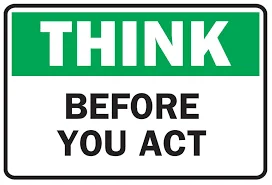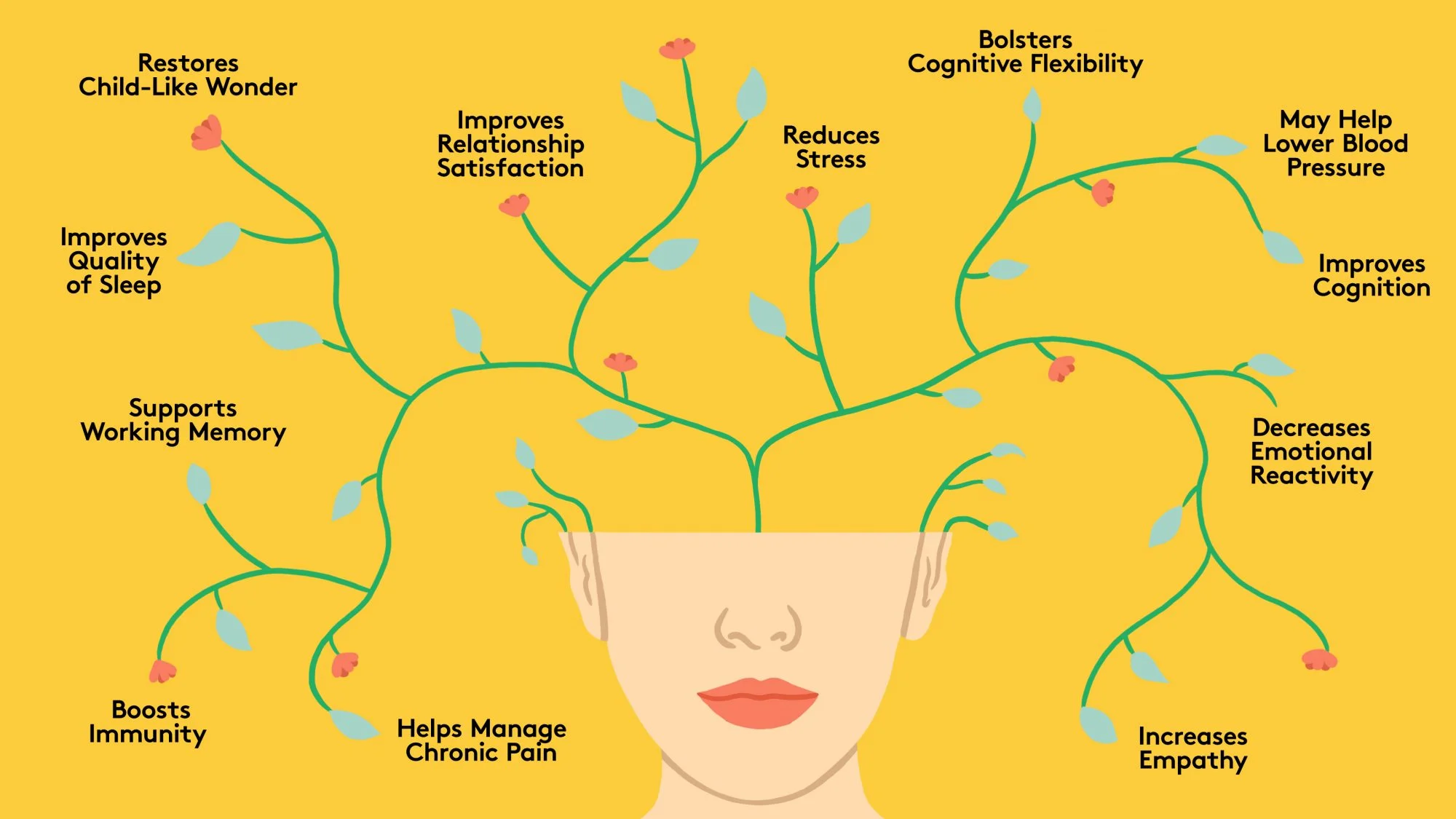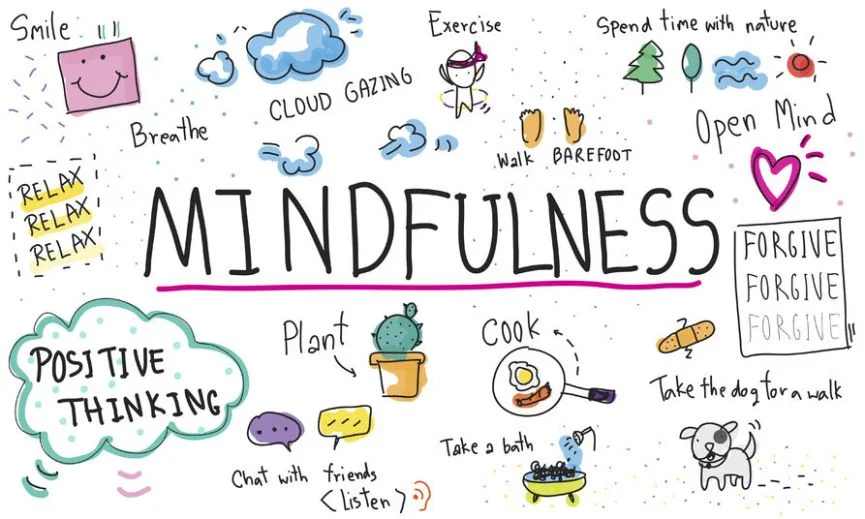Do you ever feel like you’re always living in the past or the future? That you never really take the time to experience the present moment? If so, you’re not alone. A lot of people find it difficult to live in the present moment. But mindfulness can help. In this blog post, we will discuss what mindfulness is and how it can help you live in the present moment. We’ll also provide some tips for getting started with mindfulness. So if you’re ready to start living more mindfully, keep reading!
Contents
What Is Mindfulness?
 Mindfulness is the practice of purposely focusing your attention on the present moment—and accepting it without judgment. It’s being aware of your thoughts and feelings as they happen, without trying to control them. Mindfulness can help you become more aware of your own habits and tendencies so that you can change them if you want to.
Mindfulness is the practice of purposely focusing your attention on the present moment—and accepting it without judgment. It’s being aware of your thoughts and feelings as they happen, without trying to control them. Mindfulness can help you become more aware of your own habits and tendencies so that you can change them if you want to.
There are many ways to practice mindfulness, but the most important thing is to find a method that works for you and that you will stick with. Some people like to meditate, while others may prefer yoga or simply taking a few deep breaths when they start feeling overwhelmed. The key is to be patient and keep practicing even when it feels hard or uncomfortable. With time, mindfulness will become second nature and you’ll be able to enjoy the benefits it has to offer.
Different Ways To Practice Mindfulness
There are many different ways through which one can practice mindfulness.
Meditation
 Meditation is one of the most popular ways to practice mindfulness. In meditation, you focus your attention on a specific object, such as your breath, a mantra, or a picture in your mind. This helps you to stay focused and present at the moment.
Meditation is one of the most popular ways to practice mindfulness. In meditation, you focus your attention on a specific object, such as your breath, a mantra, or a picture in your mind. This helps you to stay focused and present at the moment.
Yoga
Another great way to practice mindfulness is through yoga. Yoga combines physical poses with deep breathing exercises and meditation. By focusing on your body and how it feels as you move through the poses, you can learn to be more mindful of the present moment.
Walking
 A simple way to practice mindfulness is by walking mindfully. Pay attention to everything around you—the sights, sounds, smells, and textures. Notice how your feet feel as they touch the ground. When your mind starts to wander, bring your attention back to the present moment.
A simple way to practice mindfulness is by walking mindfully. Pay attention to everything around you—the sights, sounds, smells, and textures. Notice how your feet feel as they touch the ground. When your mind starts to wander, bring your attention back to the present moment.
Deep Breathing
When you feel overwhelmed or stressed, deep breathing can be a great way to practice mindfulness. Sit or stand tall, close your eyes, and focus on taking deep breaths in and out. Feel the air as it enters and leaves your body. Notice the sensations in your lungs and abdomen. When your mind starts to wander, simply bring your attention back to your breath.
Thinking Before Acting
 This is one mindfulness exercise that helps in controlling the mind. This can be done by writing down the pros and cons of a situation before taking any action. This also includes thinking about the potential consequences of your actions.
This is one mindfulness exercise that helps in controlling the mind. This can be done by writing down the pros and cons of a situation before taking any action. This also includes thinking about the potential consequences of your actions.
Mindful Eating
Another popular way to practice mindfulness is by being mindful while you eat. Pay attention to the food in front of you, and how it smells and tastes. Chew slowly and mindfully, and focus on the sensations that eating provides. When your mind starts to wander, bring your attention back to the present moment.
Listening To Your Body
Mindfulness can also be practiced by listening to your body. If you’re feeling tired, for example, take a break instead of pushing yourself to continue working. If you’re hungry, eat something healthy rather than grabbing whatever is quickest and most convenient. Pay attention to the signals your body is sending you, and act accordingly.
Listen To Your Emotions
 Another way to practice mindfulness is by listening to your emotions. When you feel a strong emotion such as anger, sadness, or happiness, take a moment to explore what’s going on. What triggered the emotion? What are the sensations that go along with it? Try not to judge or analyze yourself—simply observe what’s happening.
Another way to practice mindfulness is by listening to your emotions. When you feel a strong emotion such as anger, sadness, or happiness, take a moment to explore what’s going on. What triggered the emotion? What are the sensations that go along with it? Try not to judge or analyze yourself—simply observe what’s happening.
Connecting With Senses
This is a mindfulness exercise that can be done anywhere, at any time. Simply focus on one of your senses and connect with it as deeply as possible. Notice the colors, smells, sounds, and textures around you. Pay attention to how the object or sensation makes you feel. When your mind starts to wander, bring your attention back to the sense you were focusing on.
Chant Manually
 This is a form of mindfulness that helps to focus the mind. Chant any word or phrase you feel drawn to, and focus on the sound of your voice. Pay attention to how the chant makes you feel, both physically and emotionally. When your mind starts to wander, bring your attention back to the chant.
This is a form of mindfulness that helps to focus the mind. Chant any word or phrase you feel drawn to, and focus on the sound of your voice. Pay attention to how the chant makes you feel, both physically and emotionally. When your mind starts to wander, bring your attention back to the chant.
Benefits of Mindfulness

There are many benefits to mindfulness, both physical and mental. Some of the most common benefits include:
Improves Focus And Concentration
Mindfulness has been shown to improve focus and concentration, which can be helpful in all areas of life. Whether you’re trying to study for a test or complete a work project, mindfulness can help you stay focused and on task.
Reduces Stress And Anxiety
Mindfulness can help reduce stress and anxiety by teaching you how to accept your thoughts and feelings without judgment. It also helps you become more aware of your body’s signals so that you can address any potential sources of stress before they become too overwhelming.
Promotes Emotional Well-Being
Mindfulness can promote emotional well-being by helping you understand your emotions better. When you know what triggers your negative emotions, it becomes easier to manage them effectively. Mindfulness also helps you build self-compassion, which is essential for anyone struggling with mental health issues.
Enhances Relationship Skills
Mindfulness can also help improve your relationship skills by teaching you how to be more present and attentive when interacting with others. It helps you listen more effectively and reduces the chances of misunderstandings.
Gives You Sense Of Perspective
Mindfulness can give you a sense of perspective by helping you see that your problems are not always as bad as they seem. It teaches you to accept the present moment for what it is, which can help reduce stress and anxiety.
Makes You More Productive
Mindfulness can also help you be more productive by teaching you how to focus on one task at a time. When you’re able to stay focused and avoid distractions, you’ll get more done in less time.
Gives You More Positive Outlook On Life
Mindfulness can give you a more positive outlook on life by helping you appreciate the present moment. When you’re able to find joy in the small things, it becomes easier to be happy overall.
Makes You Responsible
Mindfulness can make someone more responsible because it takes away the excuses. People who practice mindfulness know they are only capable of controlling their own thoughts and feelings, so they take more ownership over their lives.
Improves Sleep Quality
Mindfulness can also help improve sleep quality by teaching you how to relax and de-stress before bed. It helps you disconnect from the day-to-day stressors that can keep you up at night. This can be especially helpful for people who suffer from insomnia or other sleep-related issues.
Tips To Practice Mindfulness In Daily Life
There are many tips to help you practice mindfulness in your daily life. Here are a few of the most effective tips:
Do It Every Day
 One tip is to practice mindfulness every day. This can be done by dedicating a certain amount of time each day to focus on your breath or body sensations. You can also practice mindfulness while you’re walking, eating, or doing another activity that you enjoy.
One tip is to practice mindfulness every day. This can be done by dedicating a certain amount of time each day to focus on your breath or body sensations. You can also practice mindfulness while you’re walking, eating, or doing another activity that you enjoy.
Be Patient
Another tip is to be patient with yourself. Mindfulness is not a quick fix for all your problems – it takes time and practice to develop the skill. Don’t expect to be able to meditate for an hour straight the first time you try it. Start with five or ten minutes and work your way up from there.
Start With Body Scanning
 A good way to start practicing mindfulness is by doing body scanning exercises. This involves focusing on individual parts of your body, starting with your head and working your way down to your toes. Pay attention to the way each part feels, both physically and emotionally.
A good way to start practicing mindfulness is by doing body scanning exercises. This involves focusing on individual parts of your body, starting with your head and working your way down to your toes. Pay attention to the way each part feels, both physically and emotionally.
Focus On Your Breath
The most basic mindfulness exercise is to focus on your breath. Sit in a comfortable position and breathe in and out slowly, focusing on how the air feels as it goes in and out of your lungs. You can also count each breath if that makes it easier for you.
Use Mantra
 A mantra is a short phrase or word that you repeat to yourself during meditation or mindfulness exercises. It can help you focus on your breath or keep you from getting distracted by thoughts that pop into your head. Some popular mantras include “ohm” and “peace.”
A mantra is a short phrase or word that you repeat to yourself during meditation or mindfulness exercises. It can help you focus on your breath or keep you from getting distracted by thoughts that pop into your head. Some popular mantras include “ohm” and “peace.”
Use Guided Meditations
If you find it difficult to focus on your breath or body sensations, try using a guided meditation. This is a recording of someone talking you through a mindfulness exercise, which can be helpful for beginners. There are many different types of guided meditations available online, so find one that suits you best.
Take Mindfulness Class
 Another option is to take a mindfulness class at a local yoga studio or community center. This gives you the opportunity to learn from an experienced instructor and ask questions if you have them. It also provides structure and accountability, which can make it easier to stick with the practice.
Another option is to take a mindfulness class at a local yoga studio or community center. This gives you the opportunity to learn from an experienced instructor and ask questions if you have them. It also provides structure and accountability, which can make it easier to stick with the practice.
Try To Do This Same Time
You should always try to do your mindfulness exercises at the same time each day. This will help you develop a routine and make it easier to stick with. Choose a time of day that works best for you, and try not to miss too many sessions in a row.
Conclusion
In conclusion, mindfulness is a skill that can be learned and improved with practice. It can help you live in the present moment, be more responsible, improve sleep quality, and reduce stress levels. There are many different ways to practice mindfulness, so find one that works best for you and stick with it!
A Word From Therapy Mantra
Your mental health — your psychological, emotional, and social well-being — has an impact on every aspect of your life. Positive mental health essentially allows you to effectively deal with life’s everyday challenges.
Also, at Therapy Care, we have a team of therapists who provide affordable online therapy to assist you with issues such as depression, anxiety, stress, relationship, OCD, LGBTQ, and PTSD. You can take our mental health test. You can also book a free therapy or download our free Android or iOS app.


